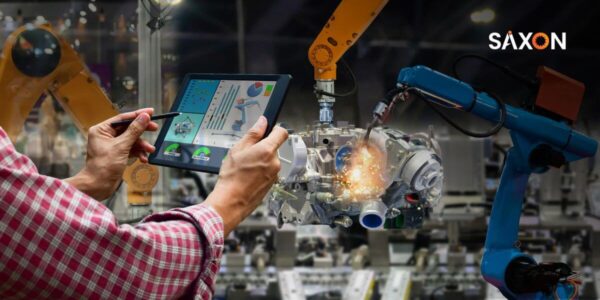AI is everywhere, widespread across industries and businesses. It is now part of our everyday life. With massive data accumulated from internal processes, equipment, supply chain, and external sources, manufacturing is a blue ocean for AI adoption. Manufacturing is supposed to generate more yearly data than retail, finance, telecom, and other industries.
As the changes caused by the internet adoption reached a plateau, the new trend, Industry 4.0, and intelligent manufacturing operations became visible over the last few years. As decision-making has become complex with the increase in information from multiple sources, manufacturers now prefer to be data-driven and utilize scalable and intelligent solutions throughout their processes.
As per the PwC survey, manufacturers attribute efficiency gains to digital transformation over the next few years. To be precise, manufacturers expect the latest disruptive technologies like AI, data and analytics, automation, and cloud to help them navigate the rapidly changing digital world. So, let us discuss the areas of implementation in this blog with a few AI use cases in manufacturing.
Why is AI crucial for Modern Manufacturing?
Adaption and Continuous Improvement – Every manufacturer aims to innovate their products, improve their product quality, improve profit margin, reduce risks, and increase overall efficiency. AI has now moved from the cost center to the profit center, and 93% of manufacturers believe that AI is core to their strategy for sustainability. Manufacturers need AI for everything to process large volumes of data, interpret results, automate processes, predict customer behavior, and detect anomalies in production processes in real-time. AI-powered systems not only solve the business challenges, but with the new ML changes, they can learn, adapt, and improve continuously.
The Value of AI – As per McKinsey’s state of AI report, organizations that use AI witness revenue growth and cost savings. The cost savings can range between 10-19% and the revenue growth between 6-10%. AI systems can handle operation challenges, and supply chain disruptions, and improve product quality and innovation with predictive analytics. Another survey from McKinsey stated that AI could improve forecasting accuracy by 10-20%, which can indirectly impact a 2-3% increase in revenue and a 5% reduction in inventory costs.
The Future with AI – As we continue to talk about the AI use cases in manufacturing and the efficiencies in detail, the other benefits of AI include:
- Cost savings by optimizing resources and revenue growth by enhancing the internal processes to be customer-centric
- Reducing machine downtime with predictive maintenance
- End-to-end visibility of supply chain
- Improve resilience and reduce labor costs
- Better product quality with efficient inspection practices
A few examples of AI implementation
- Danone Group, a French food manufacturer, implemented AI to improve their demand forecasting. It resulted in a reduction in forecasting errors by 20%, a decrease in lost revenue by 30%, and a reduced workload by 50%.
- On the other hand, BMW Group leveraged AI (image recognition) for quality checks and inspections. It could eliminate their deviations from the target despite any actual faults. The auto manufacturer could achieve high precision in their manufacturing operations.
A few AI Use Cases in Manufacturing
- AI for supply chain
Manufacturers can leverage AI-enabled systems to assess different scenarios in the supply chain to impact time, cost, and revenue. With AI, you can predict the optimal routes for delivery, track human performance in real-time, predict delivery times with historical data and append traffic and weather reports for better route planning. All this is about product delivery to the end customers.
AI can also bring more visibility to the supply chain with capacity planning and inventory optimization. You can set up a supplier assessment model, wherein failure from a supplier can trigger alternate options without any disruption. Also, the production, demand, and supply numbers are analyzed accurately in real-time to improve inventory tracking and management.
As per McKinsey, an AI-enhanced supply chain can help in:
- Reduction of forecasting errors by 20-50%
- Decreasing the lost revenue by around 65%
- Reduce over-stocking inventories by 20-50%
- Factory Automation
Manufacturing workers depend primarily on their experience and intuition to monitor many equipment settings and adjust them manually. It strains their operating efficiency as well as they need to run tests and do some troubleshooting activities as well. This can impact the OEE as the operators may take shortcuts and focus on aspects other than the economic value.
Manufacturers can improve their equipment effectiveness and reduce labor costs by leveraging AI. It includes:
- Continuous tracking and monitoring of operations to identify any anomalies quickly
- A central repository of operations data to predict the optimal equipment settings
- Automate complex tasks so that scaling up according to demand becomes easy
Manufacturing giant Siemens teamed up with Google to use AI, computer vision, and analytics to improve shop floor productivity.
- AI-based design
Before designing any product, manufacturers must test various scenarios and arrive at the best possible outcome. By leveraging AI, the generative design software can consider multiple input parameters like size, weight, manufacturing methodologies, raw materials, and other cost constraints to generate various design combinations.
Car manufacturer, Nissan leveraged AI to develop new car designs in hours.
- AI and IoT
As the usage of connected devices equipped with sensors continues to improve in manufacturing operations, analyzing data from these devices allows for enhanced productivity and precision. With AI and IoT, manufacturers can:
- Monitor equipment performance, temperature and machine settings, and workplace safety
- Leverage HVAC and smart lighting for optimized energy consumption
- Use advanced analytics with edge devices on the production floor
- Predictive Maintenance
Global management consulting firm BCG says that predictive maintenance is essential in Industry 4.0. Also, McKinsey says that predictive maintenance provides excellent value to manufacturers. With AI-powered systems, manufacturers can:
- Prevent unplanned equipment breakdown by spotting any anomalies and inefficiencies.
- Reduce equipment downtime by predicting the maintenance of various spare parts and the overall equipment
- Analyze individual components to reduce the cost of replacing the overall machinery
- Process Automation
Manufacturers can optimize their production workflows by leveraging AI-powered process mining tools. Additionally, the current intelligent automation practices evolving can help in invoice processing, customer service, document management, and other vital business functions.
Usually, manufacturers operate in different physical locations. You can compare the performance across various operational facilities to optimize processes and resources.
- Quality Control and Inspections
Inspecting every production process for defects and quality conformance is essential for manufacturers as it affects their revenue and product recall. Manufacturers can leverage computer vision and image recognition technologies to inspect every aspect of the production process. Usually, AI-powered systems can detect the defects that a human eye can miss and suggest corrective measures accordingly.
Another use of AI in manufacturing is to compare the actual assembly parts to the ones provided by the suppliers to find any quality deviations.
- Reimagining Sales and Support
Manufacturers’ sales support is not very tech-savvy. By leveraging NLP and conversational AI, they can engage their leads while also answering the basic queries about the products before the sale. Information access is becoming key in this digital era.
AI can help manufacturers build customer loyalty, enhance customer support, learn from feedback and in turn generate more revenue.
- Connected Factory
Connected Factories powered by data, IoT, and cloud are the way forward for manufacturers in the future. It can help manufacturers to:
- Track multiple assets utilization
- Provide real-time visibility into the production equipment and shop floor
- Create a single source of truth for all the data through the processes
- Scale capacity without many interventions as per the demand
- Order Management
Order Management systems must be agile for manufacturers so that they can adjust according to the demand fluctuations, market changes, and customer preferences. Using AI, manufacturers can:
- Automatically create order entries
- Create purchase requests automatically by using sensors to track the inventories
- Seamlessly manage inventory planning
The AI Use cases in Manufacturing listed above are not the complete list. As per the need and problem statement, manufacturers need to leverage AI to get rid of the challenges.
Why do AI projects fail?
As per Harvard Business Review, 84% of C-suite executives understand the need for adopting AI, but only 16% moved ahead for further steps to realize the value of AI. Why?
- Most organizations focus on building advanced analytics models to prove a point rather than resolving business challenges
- In most cases, technical folks are obsessed with model viability and do not understand the critical aspects of scaling the use case
- Instead of focusing on multiple PoCs, organizations should strategically plan the priorities, analytics techniques, governance, and business value
The right strategic partner with a consulting-led approach can help you succeed with AI initiatives. Contact us for a strategic AI transformation.
















